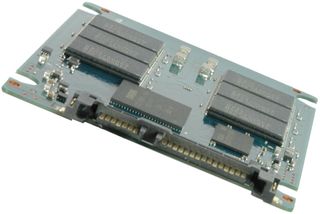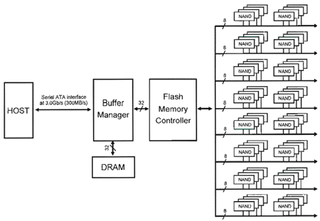Hot or Not? New Samsung and Solidata SSDs
Inside Samsung’s SSD

Its 80 g weight makes the 256 GB 2.5” PB22-J 20% lighter than conventional hard drives, and it can operate in a wider temperature range of 0-70°C. In contrast, mechanical drives are typically specified for 5-60°C or even less.
Unlike most other flash SSDs, Samsung’s data sheet specifies that the device supports Native Command Queuing (NCQ) with a queue depth of up to 32 commands. This is not the case for most flash SSDs, with the exception of a few of the latest products based on Samsung or Promise controllers. Samsung also specifically says that the drive supports device and host initiated power management, which means that the flash SSD can be put into a low power idle mode by the operating system, or it can do this on its own.

Like Intel’s X25 family, Samsung built the new device on multi-channel flash memory, which is imperative not only to support fast read performance, but to ensure that it can actually write at a decent speed. In fact, Samsung’s new PB22-J is the fastest writing flash SSD based on MLC flash memory. The device utilizes a controller that was developed by Samsung, and it incorporates a 1 Gbit SDRAM chip as a drive cache memory. This is necessary to support NCQ, and to make sure that the eight memory channels can be utilized at maximum efficiency.


Stay on the Cutting Edge
Join the experts who read Tom's Hardware for the inside track on enthusiast PC tech news — and have for over 25 years. We'll send breaking news and in-depth reviews of CPUs, GPUs, AI, maker hardware and more straight to your inbox.
Current page: Inside Samsung’s SSD
Prev Page Samsung SSD PB22-J (256 GB MLC Flash) Next Page Solidata X1-64 (64 GB SLC)Most Popular

